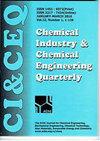Pine cones powder for the adsorptive removal of copper ions from water
IF 0.8
4区 工程技术
Q4 CHEMISTRY, APPLIED
Chemical Industry & Chemical Engineering Quarterly
Pub Date : 2021-01-01
DOI:10.2298/CICEQ200101001O
引用次数: 4
Abstract
This research investigates the adsorption potential of pine cones powder (PCP) for the removal of copper ions (Cu(II)) from aqueous solutions. The process of adsorption was reasonably fast to be completed within a time of 60 min. The pseudo-second order kinetic model describes properly the Cu(II) adsorption by PCP. The adsorbent was characterised by various instrumental techniques and batch experiments were conducted to investigate the effect of PCP dose, solution pH, particle size and initial Cu(II) concentration on adsorption efficiency. Optimum Cu(II) removal occurred at a slightly acidic pH, with a particle size less than 100 ?m. The effective PCP dose was estimated to be 36 g.L-1. The increase in the initial concentration of Cu (II) was accompanied by a reduction in the rate of its reduction by almost half. The Langmuir model was the best fitting isotherm with a maximum adsorption capacity of 9.08 mg.g-1. The thermodynamic parameters values showed that the Cu(II) adsorption was a spontaneous and endothermic process. The results of this research suggest that Cu(II) could be removed through an environmentally friendly process using PCP as low-cost natural wastes.松果粉用于吸附去除水中的铜离子
研究了松果粉末(PCP)对水溶液中铜离子(Cu(II))的吸附性能。PCP吸附Cu(II)的准二级动力学模型较好地描述了PCP吸附Cu(II)的过程。采用各种仪器技术对吸附剂进行了表征,并进行了批量实验,研究了PCP剂量、溶液pH、粒径和初始Cu(II)浓度对吸附效率的影响。最佳的Cu(II)去除条件为微酸性pH,粒径小于100 μ m。PCP的有效剂量估计为36 g.L-1。随着Cu (II)初始浓度的增加,其还原速率降低了近一半。Langmuir模型是最佳的拟合等温线,最大吸附量为9.08 mg.g-1。热力学参数值表明,Cu(II)吸附为自发吸热过程。本研究结果表明,利用PCP作为低成本的天然废物,可以通过一种环境友好的工艺去除Cu(II)。
本文章由计算机程序翻译,如有差异,请以英文原文为准。
求助全文
约1分钟内获得全文
求助全文
来源期刊

Chemical Industry & Chemical Engineering Quarterly
CHEMISTRY, APPLIED-ENGINEERING, CHEMICAL
CiteScore
2.10
自引率
0.00%
发文量
24
审稿时长
3.3 months
期刊介绍:
The Journal invites contributions to the following two main areas:
• Applied Chemistry dealing with the application of basic chemical sciences to industry
• Chemical Engineering dealing with the chemical and biochemical conversion of raw materials into different products as well as the design and operation of plants and equipment.
The Journal welcomes contributions focused on:
Chemical and Biochemical Engineering [...]
Process Systems Engineering[...]
Environmental Chemical and Process Engineering[...]
Materials Synthesis and Processing[...]
Food and Bioproducts Processing[...]
Process Technology[...]
 求助内容:
求助内容: 应助结果提醒方式:
应助结果提醒方式:


